Why Does Your Nose Run In Cold Weather?

Much of the United States is about to get hit with a cold snap, with temperatures dipping into the single digits at night and barely rising much higher than that during the day. And with cold temperatures, come runny noses, so pack some extra tissues before leaving the house.
A cold front is expected to affect most of the Midwest and the Northeast in the coming days through the New Year's Eve holiday weekend. In addition to the frigid temperatures, the wind chill is expected to worsen the conditions. Some officials were even instituting cold weather protocols ahead of the front's arrival, according to Weather.com.
Severe cold can present a host of health concerns that can range in severity from life-threatening to solely annoying. While a runny nose might seem like a nuisance it's actually the body's way of trying to make keep the lungs from getting irritated by cold air, according to David King of The University of Queensland.
This occurrence is called cold-air rhinitis. Rhinitis on its own is simply an irritation of the nose and it can either be caused by allergies or not, or it could be a combination. Cold-air rhinitis, or skiers nose, is irritation of the nose caused by cold air. So when a person steps outside into the cold, the nose works to try to warm up the air before it gets to the lungs. Sometimes this results in congestion, or postnasal drainage, and a runny nose.
When cold air enters through the nose, it sets off a nerve response in the nose that then notifies the nerves in the brain about the cold air. The body then responds by increasing the blood flow to the nose and more secretions are introduced to warm and moisten the air passing through the nose, according to King.
This process is natural and fairly difficult to avoid, although if it is connected to allergies at all, taking an allergy medicine like an antihistamine can help reduce symptoms. Additionally preventing the nose from responding to the cold air in the first place might work. Keeping a humidifier on in rooms or making the temperature warmer can help create the right conditions for avoiding a runny nose. There are also saline nasal sprays that can help keep the nose from drying out or getting irritated.
© Copyright IBTimes 2024. All rights reserved.





















